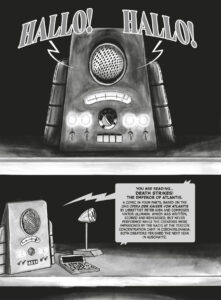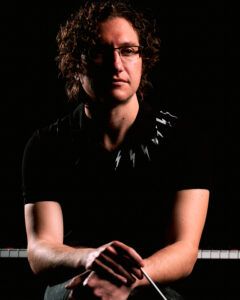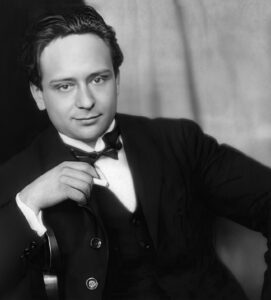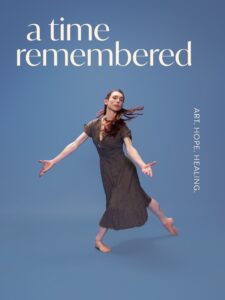By Andrew Adler
Community Editor
Two inmates at a Nazi concentration camp create an opera, only to perish in Auschwitz along with their entire cast and orchestra – except for a pair of prisoners. One of them, a teenage violinist who miraculously escapes death, eventually finds his way to Louisville and becomes concertmaster of the city’s symphony orchestra. While it sounds like the premise of a Holocaust film, this is the true story of former Louisville Orchestra concertmaster Paul Kling and “Der Kaiser von Atlantis.”
The dual narrative of the opera and Kling — demonstrating how art can articulate the unspeakable –will unfold in coming weeks as the orchestra, Kentucky Opera and the Louisville Ballet present works honoring International Holocaust Remembrance Day, which each year falls on January 27 — the anniversary of the liberation of Auschwitz-Birkenau in 1945.
Music Director Teddy Abrams will conduct the orchestra and a roster of singers on Jan. 25 in a fully staged performance of “Der Kaiser von Atlantis,” an approximately hour-long opera composed by Viktor Ullmann with a libretto by Peter Kien, written in 1943 while both men were imprisoned in the Nazi concentration camp of Theresienstadt. Ullman and Kien subsequently died in Auschwitz, but their opera survived long enough to gain a foothold in the repertory – an expression of hope amid manifestations of darkest despair.
The program at the Kentucky Center for the Performing Arts opens with Brittany Green’s “Thread and Pull,” the latest entry in the LO’s “Journeys of Faith” series highlighting shared themes in Black and Jewish music – which has included a collaboration between the Jewish Federation of Louisville and several area Black churches.
Feb. 1-2, the Louisville Ballet will present “A Time Remembered,” a program comprising Jake Heggie’s 30-minute, solo soprano operatic song cycle “Another Sunrise” (in partnership with Kentucky Opera) and “Light/The Holocaust & Humanity Project,” originally choreographed by Morganfield, Kentucky native Stephen Mills for Ballet Austin in 2005. The Louisville Ballet’s performances are a partnership with the Jewish Federation and Kentucky Opera in honor of the late Minx and Sy Auerbach, with underwriting by the Jewish Heritage Fund and the Auerbach family.
(Minx Auerbach will also be honored during a pre-performance Remembrance Dinner Feb. 2 at 5 p.m. at the Galt House.)
Among a constellation of fascinating backstories, “Der Kaiser von Atlantis” (its full title in English is “The Emperor of Atlantis, or The Disobedience of Death”) carries an origin narrative with a specifically Louisville connection. One of the Theresienstadt inmates was 14-year-old Paul Kling, already an acclaimed violinist, who was slated to play for an anticipated camp performance of the opera.
That performance never took place – Nazi administrators regarded the work’s sardonic character as an affront to Hitler – and not long afterward Kling miraculously survived a forced march from Auschwitz by hiding in a forest under the corpse of a fellow inmate. Only one other “Kaiser”-connected Theresienstadt inmate survived after being transported to Auschwitz.
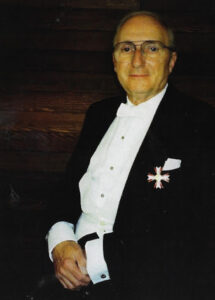
Violinist Paul Kling, who survived the Holocaust to eventually become concertmaster of the Louisville Orchestra
Eventually Kling found himself in Louisville, where he spent the years 1959-1975 as the LO’s concertmaster, and a revered violin teacher at the University of Louisville School of Music. Later he moved to Canada, where for two decades he taught at the University of Victoria in British Columbia. He died in January of 2005.
“It’s an incredible story,” says Abrams. “I’d heard the name ‘Paul Kling,’ but didn’t know that was his history. And when I found out, of course I started trying to find an opportunity to perform” the opera. “Then a friend of mine, who runs the program ‘Recovered Voices,’ brought to my attention that there was a graphic novel of the opera being produced, which sounded like a fascinating but strange idea. How do you take such an obscure and unusual story – and one that is told through musical language, and produce a graphical version of it?”
The novel in question, an adaptation of the opera by Dave Maass and Patrick Lay, was published just this past January. Its illustrations are the basis of projected scenery that will be utilized in the upcoming production, which is being staged by Atlanta Opera’s Gregory Luis Boyle.
Abrams was determined to bring the work, conceived inside the Nazis’ so-called “model” concentration camp populated largely by artists and intellectuals, to local audiences. “I thought, ‘This has to happen,’ he says. “It’s a necessity.”
A necessity and for this Jewish conductor, what became an abiding, passionate imperative.
“I feel like these stories about connections between Louisville and the greater world, and to global history, are important for us to understand our own heritage. And when I discovered this connection between Paul Kling, this piece of music, the Holocaust and our city, it felt like a story that needed to be told.”
The opera, which lay fallow until its world premiere by the Netherlands Opera on December 16, 1975, incorporates highly stylized music and story elements. Two principal characters, Death and the Emperor, spar over who will preside over a conflict in which there are no survivors.
“It’s an extraordinary work,” says LO chief executive Graham Parker, “and such an important statement for the city of Louisville, and for music that was suppressed during the Nazi era, and obviously for Ullman, who was murdered along with the whole cast. It just seemed a vitally important piece to perform, so we set about doing that.”
The LO production is being made possible with significant support from Paul and Viki Diaz, and Dr. Karen Abrams and Dr. Jeffrey Glazer.
Louisville Ballet’s
“A Time Remembered”
A similar impetus to honor the past is behind the Louisville Ballet’s “A Time Remembered.” If the program’s title sounds familiar, it’s probably because the company originally had planned to revive its 1995 production of Israeli choreographer Domy Reiter-Soffer’s full-evening “A Time to Remember.” But roadblocks to obtaining rights to the music compelled the company to pivot – resulting in the current pairing.
Each work centers on a Holocaust survivor. Heggie’s “Another Sunrise,” commissioned by the Seattle-based chamber music consortium Music of Remembrance and sung by soprano Caitlyn Lynch, tells of Krystyna Zywulska (born Sonia Landau in 1914), author of the memoir “I Survived Auschwitz.”
A resident of the Warsaw Ghetto, in 1943 Zywulska was captured by the Gestapo and transported to Auschwitz-Birkenau, where she began writing what a program note describes as “satiric poems that became camp anthems of resistance.” Her memoir was published in 1946 under the title “I Came Back,” after which she lived quietly until her death in 1993.
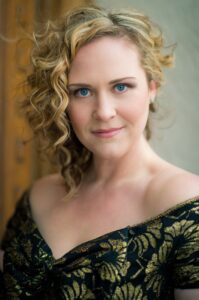 The Ballet’s production of “Light/The Holocaust & Humanity Project” is bound up with the life of survivor Naomi Warren. Born in 1920, in early 1942 she and her family were transported to Auschwitz-Birkenau, where her mother, husband and sister-in-law were murdered.
The Ballet’s production of “Light/The Holocaust & Humanity Project” is bound up with the life of survivor Naomi Warren. Born in 1920, in early 1942 she and her family were transported to Auschwitz-Birkenau, where her mother, husband and sister-in-law were murdered.
After three years in Auschwitz, Warren was transferred to the Ravensbruck women’s concentration camp, and finally to Bergen-Belsen, where she was liberated by Allied forces in 1945. After the war, she lived in Houston for many years as a businesswoman and Holocaust educator, before dying in 2016 at the age of 96.
Lasting a little under 90 minutes without intermission, “Light/The Holocaust & Humanity Project” employs a diverse musical palette of works by composers Steve Reich, Evelyn Glennie, Michael Gordon, Arvo Pärt and Philip Glass. Its movement vocabulary, blending classical and contemporary idioms, is purposeful in its broad accessibility.
“We forget, sometimes, how dance unites all of humanity because there’s no language barrier,” emphasizes Harald Uwe Kern, the Louisville Ballet’s co-artistic director. “Anybody can understand it – you don’t have to explain.”
“Dance is about expression of feelings,” says Helen Daigle, a veteran former company dancer who is now its principal repetiteur and senior rehearsal director. “And if there is something the Holocaust brings about, it is a multitude of feelings. When Stephen (Mills) was explaining where the inspiration for this piece came from and why he (decided) to tackle it, it instilled all of those feelings in us.”
“Stephen spoke to the entire company and staff so everyone could be familiar with the process and backstory,” says Mikelle Bruzina, the Louisville Ballet’s co-artistic director. Such backgrounding was vital in providing dancers with valuable interpretive perspective. “It provides an opportunity,” Bruzina points out, “for them to have an inner dialogue.”
With its unusual depth of emotion, Mills’ choreography ranges widely in thematic embrace – from Adam and Eve to the horrors of the Holocaust and, finally, to a kind of overarching redemption. “It starts joyously with family and community,” Daigle explains, “goes into the breaking up of that community, and then right into what is absolutely a camp,” where “you watch the people, one by one, filter away. There are sections of this ballet where it’s hard to be in the studio.
“Then it finishes with the turning of the page, with the joy and hope that the survivors bring to keep the story alive and teach us not to repeat those things.”
Since its 2005 Ballet Austin premiere, the work has travelled widely in the U.S. and abroad; its overseas presence included three performances in Israel during the fall of 2013. One of the stops was the northern city of Akko, located in Louisville’s Partnership2Gether Western Galilee region.
“We at Louisville Ballet are incredibly proud to bring this meaningful production to the Commonwealth in partnership with the Jewish Federation of Louisville and Kentucky Opera,” says Ballet CEO Leslie Smart.
“This remarkable ballet holds deep significance. We are profoundly grateful for the generosity of the Jewish Heritage Fund and the Auerbach family, whose support has made this collaboration possible.”
“Light/The Holocaust & Humanity Project” is certainly not the only dance piece dealing with the Holocaust. Indeed, one of the Louisville Ballet’s most powerful repertory works has been its production of Antony Tudor’s 1963 “Echoing of Trumpets,” which tells how the Nazis annihilated the Czech village of Lidice on June 9, 1942, murdering 192 men and boys, 60 women and 88 children.
Initiatives like “Light/The Holocaust & Humanity Project,” “Another Sunrise” and “Der Kaiser von Atlantis” serve not only to enlighten and entertain, but also to honor the memory of those who perished and those who – like Paul Kling, Krystyna Zywulska and Naomi Warren — survived one of history’s most infamous demonstrations of collective brutality.
“I want to stress how important it was for us, as artistic leaders, to (acknowledge) the 80th anniversary of this event,” Kern says. “Because there are people out there who don’t even know that it happened or deny that it happened.”
“This is a living history,” Abrams says, referencing Kling and students of his that still play in the orchestra. “For us to know this information and not celebrate and retell that story in some form would be a terribly missed opportunity. And I think people in town are always fascinated when they learn something about their city that connects with something larger.”
Want to go?
The Louisville Orchestra’s performances of Brittany Green’s “Thread and Pull” and Viktor Ullmann’s opera “Der Kaiser Von Atlantis” will be given Saturday, Jan. 25 in Whitney Hall of the Kentucky Center for the Performing Arts. The Louisville Ballet’s “A Time Remembered” program will be performed Saturday, Feb. 1 at 8 p.m.; and Sunday,Feb. 2 at 2 and 8 p.m., also at the Kentucky Center.
To learn more about and purchase tickets for these performances and more International Holocaust Remembrance Day community events, visit https://louisvilleremembers.org For information about the Louisville Ballet’s Remembrance Dinner, go online at https://www.louisvilleballet.org/remembrance-dinner/.
And at the University of Louisville:
Needle and Thread comes to the U off L on Jan. 27
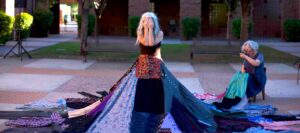
Needle and Thread — Suzanne Miller and Mindy Yan Miller — a production at Arizona State University in October of 2018 (Photo by Anna Clare Spelman)
On Jan. 27 – International Holocaust Remembrance Day — dancer Suzanne Miller – in collaboration with Mindy Yan Miller — will perform a dance of Holocaust commemoration titled “Needle and Thread” at the University of Louisville’s University Club Ballroom. on International Holocaust Remembrance Day, January 27. Accompanied by original sound and music, the 7 p.m. performance “creatively integrates contemporary dance and women’s traditional textile production to commemorate the victims of the Holocaust.”
“Needle and Thread” starts from a list of 600 given names of Holocaust victims collected by Yad Vashem in an extensive and ongoing project: ‘Pages of Testimony’. The work is a commemorative performance that develops from the dance and installation practices of Suzanne Miller and Mindy Yan Miller: Mindy sits and sews onto a large, pieced skirt constructed from unwanted garments, adding her thoughts and labor, stitch by stitch. Suzanne wears the skirt and performs a series of embodied inscriptions, tracing each of the given names gathered from the “’Pages of Testimony.’” Allan Paivio’s sound design “deploys whispers and song as the names punctuate and weave through an ambient industrial undertone, contrasted with the calls of songbirds.”
An October, 2019 blog entry by Vancouver, B.C. artists Lori Weidenhammer and Lois Klassen on their website slofemists.com carried the following appraisal:
“The components of Needle and Thread were on display while we were there, as if in-waiting for the artists to make them come alive. A circle of clothing stitched together was lying on the floor, ready for one of the performers to take her place in a waist-sized opening in the centre, and another to work on the periphery where more clothing would be attached. Behind this large disc of used clothing, a video projected names from the archives of Yad Vashim (The World Holocaust Remembrance Centre) up the wall like a movie’s final credits. An evocative sound work by Allan Paivio repeated this list of first names with softness and intensity.”
Want to go?
Admission to the Jan. 27 performance of Needle and Thread is free. The University Club Ballroom is located at 200 E. Brandeis Ave.




